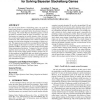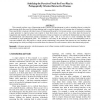19 search results - page 1 / 4 » Cheating Is Not Playing: Methodological Issues of Computatio... |
ECAI
2006
Springer
13 years 8 months ago
2006
Springer
Abstract. Computational Game Theory is a way to study and evaluate behaviors using game theory models, via agent-based computer simulations. One of the most known example of this a...
NETGAMES
2004
ACM
13 years 9 months ago
2004
ACM
Ordering of command messages from the clients at the game servers is an important issue that impacts fairness, response times, and smoothness of the game play. Recently, protocols...
ATAL
2008
Springer
13 years 6 months ago
2008
Springer
In a class of games known as Stackelberg games, one agent (the leader) must commit to a strategy that can be observed by the other agent (the follower or adversary) before the adv...
CA
2003
IEEE
13 years 9 months ago
2003
IEEE
This research explores ways of harnessing people’s passion for entertainment in order to stimulate players to attain the meta-learning skills they need for lifelong learning and...
GROUP
2009
ACM
13 years 10 months ago
2009
ACM
Networked multiplayer games must support a much wider variety of interactions than single-player games because networked games involve communication and coordination between playe...



